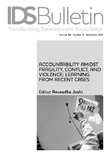Myanmar’s Top-Down Transition: Challenges for Civil Society
| dc.contributor.author | Brenner, David | |
| dc.contributor.author | Schulman, Sarah | |
| dc.coverage.spatial | Myanmar | en |
| dc.date.accessioned | 2019-09-27T15:30:16Z | |
| dc.date.available | 2019-09-27T15:30:16Z | |
| dc.date.issued | 2019-09-27 | |
| dc.identifier.citation | Brenner, D. and Schulman, S. (2019) 'Myanmar’s Top-Down Transition: Challenges for Civil Society', in Joshi, A. (Ed) Accountability Amidst Fragility, Conflict, and Violence: Learning from Recent Cases, IDS Bulletin 50.3, Brighton: IDS | en |
| dc.identifier.uri | https://opendocs.ids.ac.uk/opendocs/handle/20.500.12413/14723 | |
| dc.description.abstract | This article historicises the nature of political transition in Myanmar to better appreciate the challenges faced by civil society. After Myanmar’s political reforms in 2011, Western donors rushed into the country in support of what they misunderstood as a remarkable instance of democratisation. In 2019, escalating civil war, ethnic cleansing, and contracting civil liberties urge a rethink. This article argues that viewing transition in Myanmar through the lens of democratisation has always been misleading and problematic. Partial liberalisation was orchestrated by the military to safeguard its own power. Reforms have not only benefited civil society but also enabled the growth of uncivil society, fuelling sectarian violence and bolstering military rule. Operating on the assumption of democratisation, Western donors shifted funds from grass-roots networks to militarised state bureaucracies that seek to co-opt peace-building and development projects for the purposes of ethnocratic state-building and counterinsurgency. Rethinking the nature of transition is pivotal for preventing inadvertently aiding authoritarianism and conflict. | en |
| dc.description.sponsorship | Department for International Development (DFID) | en |
| dc.language.iso | en | en |
| dc.publisher | Institute of Development Studies | en |
| dc.relation.ispartofseries | IDS Bulletin;50.3 | |
| dc.rights | This is an Open Access article distributed under the terms of the Creative Commons Attribution 4.0 International licence (CC BY), which permits unrestricted use, distribution, and reproduction in any medium, provided the original authors and source are credited and any modifications or adaptations are indicated. http://creativecommons.org/licenses/by/4.0/legalcode | en |
| dc.rights.uri | http://creativecommons.org/licenses/by/4.0/ | en |
| dc.subject | Development Policy | en |
| dc.title | Myanmar’s Top-Down Transition: Challenges for Civil Society | en |
| dc.type | Article | en |
| dc.rights.holder | Institute of Development Studies | en |
| dc.identifier.team | Governance | en |
| dc.identifier.doi | 10.19088/1968-2019.128 | |
| dcterms.dateAccepted | 2019-09-27 | |
| rioxxterms.funder | Default funder | en |
| rioxxterms.identifier.project | Action for Empowerment and Accountability (A4EA) | en |
| rioxxterms.version | VoR | en |
| rioxxterms.funder.project | 776d009f-7b49-4932-a890-f5809a8edb5c | en |
Files in this item
This item appears in the following Collection(s)
Except where otherwise noted, this item's license is described as This is an Open Access article distributed under the terms of the Creative Commons Attribution 4.0 International licence (CC BY), which permits unrestricted use, distribution, and reproduction in any medium, provided the original authors and source are credited and any modifications or adaptations are indicated.
http://creativecommons.org/licenses/by/4.0/legalcode


